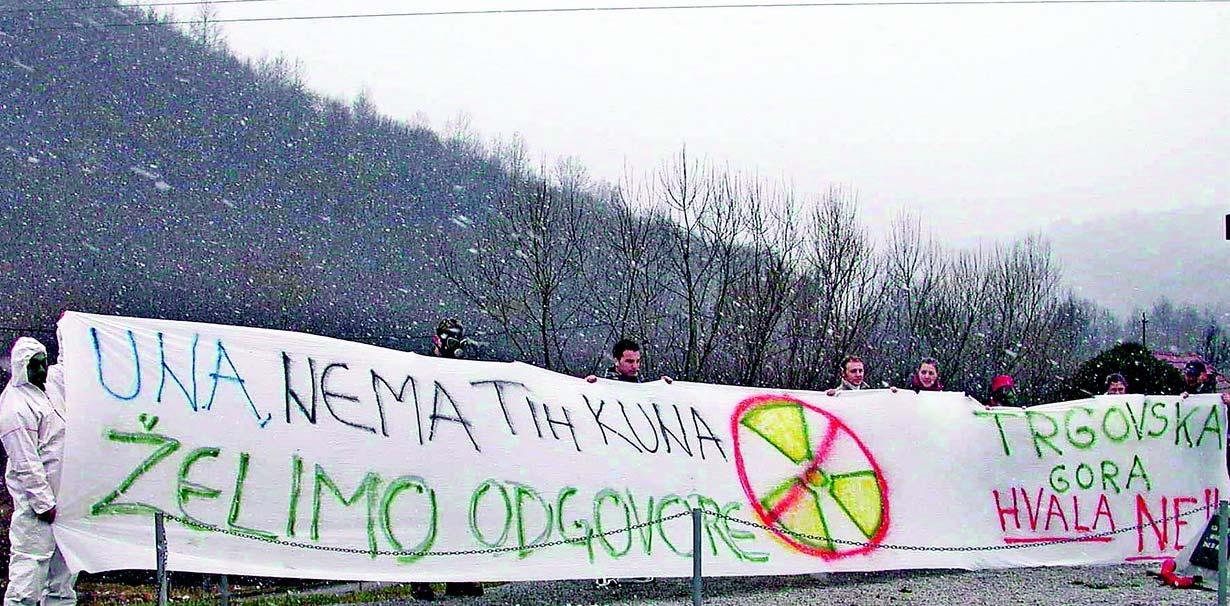Croatia's environment minister Mihael Zmajlovic said that the government will respond to Bosnia's inquiry on a planned disposal of radioactive waste at the site Trgovska gora, Minister Zmajlovic said that the development of a strategic environmental impact assessment for the national program for the implementation of the strategy for disposal of radioactive waste and used nuclear fuel didn't start, and neither did the development of the national program.
In a letter to Bosnian minister of foreign trade and economic relations, Mirko Sarovic, minister Zmajlovic wrote that once the strategic environmental impact assessment near the border with Bosnia, once the national strategy is passed is launched, the cross-border consultations will be conducted within the framework of existing international instruments. He added that Croatia will fully respect the provisions of the Protocol on Strategic Environmental Assessment together with the Convention on Environmental Impact Assessment in Trans-border matters (Espoo Convention.
Waste
Croatia Yet to Develop a National Strategy for Radioactive Waste Disposal
Friday, May 8, 2015Croatian Radioactive Waste Site Alarms Bosnians
Monday, May 4, 2015 Local communities in Bosnia - and in Croatia - are uniting in opposition to a Croatian government plan to construct a radioactive waste disposal site in a pristine natural environment.
Local communities in Bosnia - and in Croatia - are uniting in opposition to a Croatian government plan to construct a radioactive waste disposal site in a pristine natural environment.
A long-ignored local environmental issue is threatening to become a major political headache for Bosnia’s leaders, as well as a point of dispute with neighbouring Croatia.
Highly radioactive substance found in Swiss dump
Thursday, June 26, 2014GENEVA: A highly radioactive substance, emitting in some places radiation 100 times the permitted amount, has been discovered in Switzerland, local media reported on Sunday, adding that authorities had covered it up for 18 months.
Swiss weeklies Le Matin Dimanche and SonntagsZeitung reported that federal, regional and local officials decided not to reveal the fact that they had found radium deposits in an old dump in the town of Bienne so as not to scare the 50,000 local inhabitants.
A glowing review
Sunday, April 6, 2014Nuclear decommissioning: Britain is paying dearly for neglecting its nuclear waste
SWILLING around murky ponds in the oldest part of Sellafield, a nuclear research and reprocessing centre in Cumbria, is a soupy, radioactive sludge. For years boffins working on Britain’s first military and civil nuclear programmes abandoned spent fuel and other nastiness into the pools and tanks, which now grow decrepit. Though perhaps not the “slow-motion Chernobyl” which some environmental campaigners make out, the site is subject to one of the most complex nuclear clean-ups in the world.
Risk of nuclear leak sparks call for installation of flood defences
Monday, February 24, 2014Managers of a nuclear waste dump on the Cumbria coast have been ordered to start preparations to defend the site against floods and erosion, amid fears that radioactive material could one day leak into the sea.
Much of the waste buried in vaults and concrete trenches at the Low Level Waste Repository (LLWR) near the village of Drigg originates from one of the world's most contaminated nuclear sites, Sellafield, a few miles away. The waste dump is expected ultimately to require protective flood barriers.
UK 'still to notify EC on back-end nuclear waste management plan': DECC
Friday, February 7, 2014The UK's back-end nuclear waste management plans for new-build reactors have yet to be notified to the European Commission for State Aid clearance, the Department of Energy and Climate Change told Platts Wednesday.
A notification relating to the Hinkley Investment Contract, ancillary agreements and state credit guarantee was submitted by the UK to the EC on October 22, 2013. It is this notification that the EC has decided to put through an in-depth State Aid investigation.
Move to deal with deadly legacy of nuclear power plants
Tuesday, April 30, 2013Britain is set to tackle a 60-year-old problem that has dogged successive governments: how to resolve the deadly legacy from the country's first generation of nuclear power plants.
The UK is home to the world's largest stockpile of plutonium, with more than 100 tonnes of the highly radioactive material.
The Nuclear Decommissioning Authority, whose job it is to look after the plutonium, is preparing to give its recommendation on how the government should deal with the problem, with an announcement expected as early as next month.
Sellafield to be prosecuted for sending radioactive waste to wrong disposal site
Wednesday, February 13, 2013Sellafield has pleaded guilty to sending several bags of radioactive waste to the wrong facility, according to the Office for Nuclear Regulation.
The nuclear power company admitted sending four bags of mixed general waste to the Lillyhall landfill site in Workington, Cumbria, in April 2010.
The bags, which contained waste such as plastic, tissues and clothing, should have gone to the low level waste repository, at Drigg.
Cracks found in Swedish nuclear waste pools
Wednesday, December 12, 2012The Swedish Radiation Safety Authority (Strålsäkerhetsmyndigheten) has asked nuclear waste contractors at the Oskarshamn nuclear plant to review their security requirements after cracks were found in the pools where nuclear waste is temporarily stored on site.
Cement walls are cracked in two of ten waste pools at the Clab storage facility, which is run by the Swedish Nuclear Fuel and Waste Management Company (Svensk Kärnbränslehantering, SKB).
Nuclear new build programme faces uncertainty
Saturday, September 22, 2012Britain’s nuclear new build programme is facing fresh uncertainty amid fears that Cumbria county council will postpone or even reject plans to host a permanent storage facility for the country’s nuclear waste.
Local politicians have warned that the council is increasingly wary about volunteering to store hundreds of thousands of tonnes of radioactive material underground amid the rolling hills of the north-west.